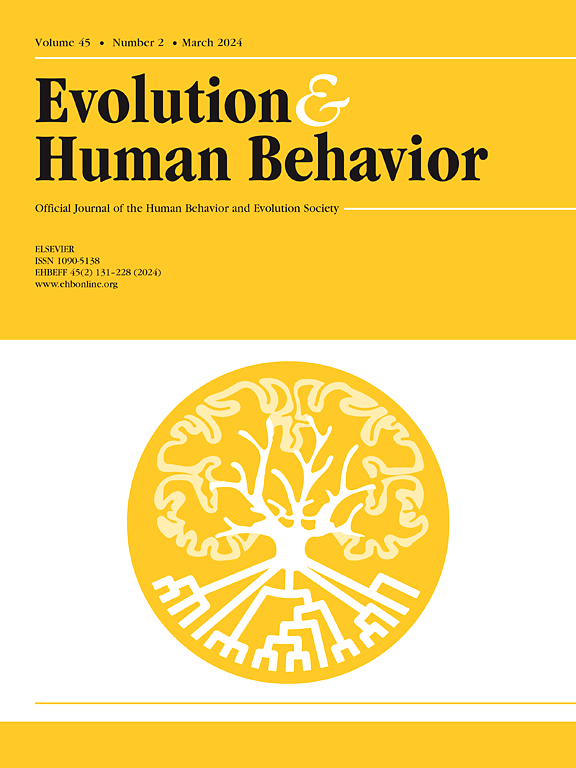不受暴力侵害的意愿,独立于力量,指导着伴侣的选择
IF 3.2
1区 心理学
Q1 BEHAVIORAL SCIENCES
引用次数: 0
摘要
从古至今,来自同种动物的身体暴力是一个反复出现的适应性问题。选择是否倾向于那些既强壮(能力强)又愿意保护我们免受暴力侵害的伴侣?力量和意愿是相互关联的,因此将它们的影响分离是必要的。在这里,我们评估了推论和偏好。在7个实验中(通过MTurk招募的4508名美国成年人),我们系统地改变了约会对象或朋友保护你免受攻击的意愿,与你没有这些信息的情况相比。我们还改变了那个人的力量。发现一个人愿意保护大大增加了他们作为浪漫伴侣或朋友的吸引力,无论他们的力量如何。这对女性和男性评分者都适用,在评估异性和同性约会对象和朋友时也适用。事实上,愿意保护你的伴侣是有吸引力的,即使他们试图这样做但失败了,即使你因为他们的失败而受到伤害。发现伴侣不愿意保护会降低他们的吸引力,这是女性评估男性约会对象时的一大障碍。当评价者是女性、被评价者是男性、被评价者是约会对象还是朋友时,不情愿更能降低吸引力。女性对男性约会对象的力量有一定的重视,但这主要是由于推断他愿意保护她们。令人惊讶的是,我们发现只有微弱的证据表明,力量的差异,独立于意愿,增加了伴侣的吸引力。本文章由计算机程序翻译,如有差异,请以英文原文为准。
Willingness to protect from violence, independent of strength, guides partner choice
Ancestrally, physical violence from conspecifics was a recurrent adaptive problem. Did selection favor preferences for partners who are both strong (highly able) and willing to protect us from violence? Strength and willingness are interrelated, so dissociating their effects is necessary. Here we assessed both inferences and preferences. In 7 experiments (N = 4,508 U.S. adults recruited via MTurk), we systematically varied the willingness of a date or friend to physically protect you from an attack, compared to scenarios where you do not have this information. We also varied that person's strength. Discovering that a person is willing to protect greatly increased their attractiveness as a romantic partner or friend, regardless of their strength. This held for both women and men raters, and when evaluating both opposite- and same-sex dates and friends. In fact, partners who were willing to protect were attractive even if they tried to do so but failed, and even if you were harmed because of their failure. Discovering that a partner is unwilling to protect decreased their attractiveness, and was a deal-breaker for women evaluating a male date. Unwillingness decreased attractiveness more when the rater was a woman, when the target was a man, and when the target was being evaluated as a date versus friend. Women placed some importance on a male date's strength, but this was mostly due to inferences about his willingness to protect them. Surprisingly, we found only weak evidence that differences in strength, independent of willingness, increased the attractiveness of a partner.
求助全文
通过发布文献求助,成功后即可免费获取论文全文。
去求助
来源期刊

Evolution and Human Behavior
生物-行为科学
CiteScore
8.30
自引率
9.80%
发文量
62
审稿时长
82 days
期刊介绍:
Evolution and Human Behavior is an interdisciplinary journal, presenting research reports and theory in which evolutionary perspectives are brought to bear on the study of human behavior. It is primarily a scientific journal, but submissions from scholars in the humanities are also encouraged. Papers reporting on theoretical and empirical work on other species will be welcome if their relevance to the human animal is apparent.
 求助内容:
求助内容: 应助结果提醒方式:
应助结果提醒方式:


